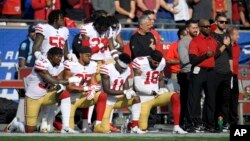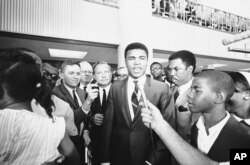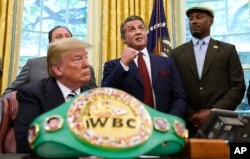U.S. President Donald Trump said Friday he plans to ask National Football League players who have kneeled in protest during the national anthem to recommend people they believe were unfairly punished by the country's justice system.
"I am going to ask all of those people to recommend to me, because that's what they're protesting — people that they think were unfairly treated by the justice system."
For nearly two years, some NFL players have been kneeling during the national anthem in an effort to raise awareness of systemic racism in the U.S., including cases of police killings of unarmed African-Americans and other minorities in which lawmen are frequently cleared of any wrongdoing.
Trump, however, has maintained the protesting players are unpatriotic because he feels their kneeling during the anthem is disrespectful to the American flag.
"They're not proud enough to stand for our national anthem," Trump said. "I don't like that." Trump also said if his review committee determines the people the athletes recommend for pardons were unfairly treated, "then we will pardon them or at least let them out."
The president's comments came during an exchange with reporters at the White House before departing for the G-7 summit in Ontario.
He revealed he is considering pardoning the late Muhammad Ali, a human rights activist and heavyweight boxing champion who was convicted in 1967 for refusing to enter the military during the Vietnam War, a conviction that the Supreme Court overturned in 1971.
Ali attorney Ron Tweel responded on Twitter, saying the president's sentiment is "appreciated."
Trump also said he is also considering pardons for some 3,000 relatively unknown people.
"I would get more thrill out of pardoning people that nobody knows, like Alice yesterday," Trump said in a reference to Alice Johnson, a first-time non-violent drug offender who had her life sentence commuted a week after celebrity Kim Kardashian urged Trump to do so.
"The way she left that jail and the tears and the love she has with her family, I mean, to me, that was better than any celebrity that I can pardon," Trump said.
Last month Trump posthumously pardoned heavyweight boxing champion Jack Johnson, whose legacy was soiled by a racially tainted criminal conviction, after actor Sylvester Stallone championed the case. He also recently pardoned conservative commentator Dinesh D'Souza, who was convicted of a campaign finance violation.
When asked about pardoning himself in the wake of the Russia investigation, Trump acknowledged, "I'm not above the law" but added, "I do have an absolute right to pardon myself, but I'll never have to do it because I didn't do anything wrong."
Some have seen the pardons as sending a message to former campaign aides now ensnared in Special Counsel Robert Mueller's probe into whether Trump's campaign colluded with Russia in the 2016 presidential election or in other legal inquiries, including Trump's longtime lawyer and legal "fixer" Michael Cohen, whose finances are under federal investigation.
Divided poll
Meanwhile, a Quinnpiac University poll released Thursday found most American voters believe that NFL players who kneel in protest during the national anthem are not unpatriotic.
Nearly 60-percent of the respondents said the kneeling players were not unpatriotic compared to 35-percent who felt they were.
The divide is even more stark among Republican voters. Seventy-percent believe they are not patriotic, while nearly one-quarter said they were.
White voters without a college degree are evenly divided on the issue. Respondents listed by age, education level, gender, political party affiliation and race generally agree kneeling players are not unpatriotic.
More than half of those surveyed said professional athletes in general have the right to protest on the venues they perform on, compared to 43-percent who felt they did not.
But when race was taken into consideration, the poll shows wide divisions on whether athletes can rightfully protest on the field or on the court. By a nearly 8-1 margin, African-American voters said they had the right while Latino voters said they did by more than 2-1. Fifty-three percent of white voters said they did not have the right compared to nearly 45-percent who said they did.
Just over half of American voters support the new NFL policy requiring players to stand for the anthem while 42-percent do not.








